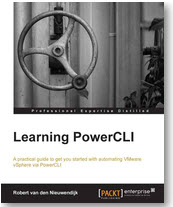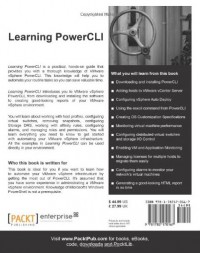
The book I'm referring to today is called simply Learning PowerCLI and it's written by a Dutch guy Robert van den Nieuwendijk (blog) who works as a freelance senior systems engineer.
You'll learn about PowerCLI from the very beginning – by Installing the PowerCLI module and connecting to your vCenter server etc. Then the learning process continue. How-to work with host profiles, configure virtual switches, remove snapshots, configure Storage DRS, work with affinity rules, configure alarms, manage roles and permissions. You will learn everything you need to know to get started with automating your VMware vSphere infrastructure. All the examples in Learning PowerCLI can be used directly in your environment.
A quick quote from the author's site about what to expect:

The book is released through Packt Publishing – an English firm specializing on IT books (I'm sure you've already heard about) and it's also available through Amazon as a paper book or as a kindle version.
IMHO, the book is a very good starting point for VMware vSphere admins willing to start automating their environments by using PowerCLI.
From my own experience, I can say that PowerCLI is very powerful and it's not easy to learn if you're not a “scripting guy”. If you're learning towards VCAP-DCA you'll need to know PowerCLI for sure as you have to deal with autodeploy and (or) hostprofiles, so this book might get you an additional knowledge which might make the difference when counting the points at the end of the exam… -:).
